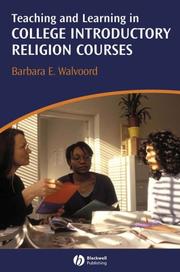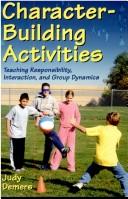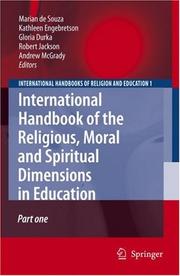| Listing 1 - 8 of 8 |
Sort by
|

ISBN: 9781405158411 9781405158428 1405158425 1405158417 Year: 2008 Publisher: Malden Blackwell
Abstract | Keywords | Export | Availability | Bookmark
 Loading...
Loading...Choose an application
- Reference Manager
- EndNote
- RefWorks (Direct export to RefWorks)
Religion --- Religious education --- Study and teaching --- 268.226 --- Ethical education --- Theological education --- Education --- Moral education --- 268.226 Catechese in hogere onderwijsvormen --- Catechese in hogere onderwijsvormen --- Religion - Study and teaching

ISBN: 9780736072069 9781718210486 Year: 2008 Publisher: Champaign, IL Human Kinetics
Abstract | Keywords | Export | Availability | Bookmark
 Loading...
Loading...Choose an application
- Reference Manager
- EndNote
- RefWorks (Direct export to RefWorks)
This book provides nearly 100 activities that will help children and young adults gain a better sense of what they value based on their character traits, become more effective communicators, and discover how to communicate their values and strengthen their convictions. Character-Building Activities: Teaching Responsibility, Interaction, and Group Dynamics applies directly to preteens and teenagers, but it is easily adapted to younger children. This resource can be used in a variety of settings both in and out of school, including youth groups and curricular areas such as language arts and social studies. The activities are short, clearly described, easy to set up, and ready to use. Teachers or group leaders can pop an activity into an existing lesson plan or use a few in creating a new lesson plan. Regardless of age and setting, the participants in these activities will learn to deal with a variety of issues, including self-esteem, peer pressure, bullies, anger, and stress. They will also acquire self-reflection skills and have opportunities to share their values and listen to other kids as they share theirs. (Bron: covertekst)
Activity programs in education --- Moral education --- 093227.jpg --- Sportpsychologie --- Character education --- Ethical education --- Child rearing --- Education --- Ethics --- Religious education --- Activity schools --- Creative activities and seat work --- Project method in teaching --- Activity programs --- Experimental methods
Book
ISBN: 9048123550 1402086253 9786612018008 1402086261 1281830925 9786611830922 1282018000 Year: 2008 Publisher: [Dordrecht] : Springer,
Abstract | Keywords | Export | Availability | Bookmark
 Loading...
Loading...Choose an application
- Reference Manager
- EndNote
- RefWorks (Direct export to RefWorks)
The essays in this book explore the interconnections between democracy, education and the moral life. Rarely are all three engaged and integrated at once so that issues in political and moral theory apply directly to critical issues in education. The authors discuss such questions as the responsibility of education and its institutions to cultivate socially responsible and critically literate democratic citizens; the challenge of cultivating democratic patriotism in teaching American history; the relationship between inclusion and exclusion in democratic education; the role of blogs in enhancing democratic learning; the development of moral sensibility in students and its significance for democratic citizenship. The authors are among the leading educational theorists whose philosophical expertise is combined with a concrete knowledge of the practice of education.
Citizenship -- Study and teaching. --- Democracy and education. --- Education, Humanistic. --- Moral education. --- Education, Special Topics --- Education --- Social Sciences --- Education, Liberal --- Humanistic education --- Liberal arts education --- Liberal education --- Character education --- Ethical education --- Education and democracy --- Aims and objectives --- Education. --- Political philosophy. --- Educational sociology. --- Education and sociology. --- Sociology, Educational. --- Educational Philosophy. --- Political Philosophy. --- Computers and Education. --- Sociology of Education. --- Data processing. --- Philosophy. --- Classical education --- Child rearing --- Ethics --- Religious education --- Political science --- Children --- Education, Primitive --- Education of children --- Human resource development --- Instruction --- Pedagogy --- Schooling --- Students --- Youth --- Civilization --- Learning and scholarship --- Mental discipline --- Schools --- Teaching --- Training --- Political philosophy --- Education—Philosophy. --- Education—Data processing. --- Education and sociology --- Social problems in education --- Society and education --- Sociology, Educational --- Sociology
Book
ISBN: 1282073370 9786612073373 311021279X 9783110212792 Year: 2008 Publisher: Berlin New York Walter de Gruyter
Abstract | Keywords | Export | Availability | Bookmark
 Loading...
Loading...Choose an application
- Reference Manager
- EndNote
- RefWorks (Direct export to RefWorks)
Religiöse Bildung und Erziehung stehen insbesondere seit dem 11. September 2001 erneut zur Diskussion. Die Herausforderungen der pluralen Gesellschaft erzwingen nicht nur eine rationale Aufklärung in Sachen Religion, sondern machen eine Erziehung zur praktischen Toleranz für den interkulturellen und interreligiösen Dialog notwendig, der die Wahrheitsfrage nicht suspendiert. In kritischer Rezeption von PISA und anderen Bildungsstudien wird untersucht, welche tatsächlichen Handlungsspielräume für die bildungspolitische Ausgestaltung eines Staat-Kirche-Verhältnisses sowohl durch das Europarecht als auch durch das Recht der Mitgliedsstaaten bestehen. Die Ausgestaltung des Religionsunterrichts ist in Europa aufgrund unterschiedlicher Bildungstraditionen sehr unterschiedlich erfolgt. Dieses Buch leistet einen Beitrag zur Entwicklung europäisch vergleichbarer Kompetenzen und Standards für eine "religious literacy". Die allgemeine und interkulturelle Pädagogik und die evangelische Theologie werden dazu in europäischer Bildungsperspektive bildungspolitisch, rechtshermeneutisch und bildungstheoretisch ins Gespräch gebracht.
Religious education --- Church and state. --- Christianity and state --- Separation of church and state --- State and church --- State, The --- Ethical education --- Theological education --- Education --- Moral education --- Programme for International Student Assessment. --- Organisation for Economic Co-operation and Development. --- International Programme for Student Assessment --- OECD/PISA --- PISA --- Programa Internacional de Avaliação de Alunos --- Program for International Student Assessment --- Starptautiskā skolēnu novērtēšanas programma --- Programme international pour le suivi des acquis des élèves --- Programa Internacional de Evaluación de Estudiantes --- European Law. --- National Law. --- Religious Formation.
Book
ISBN: 9789042919310 9042919310 Year: 2008 Volume: 54 Publisher: Leuven Peeters
Abstract | Keywords | Export | Availability | Bookmark
 Loading...
Loading...Choose an application
- Reference Manager
- EndNote
- RefWorks (Direct export to RefWorks)
Didactics of religion --- Religious studies --- Christendom en andere godsdiensten --- Christendom en cultuur --- Christianisme et autres religions --- Christianisme et culture --- Christianity and culture --- Christianity and other religions --- Contextualization (Christian theology) --- Culture and Christianity --- Culture et Christianisme --- Cultuur en Christendom --- Education religieuse de l'enfant --- Education religieuse de teenagers --- Godsdienst en cultuur --- Godsdienstige opvoeding van teenagers --- Godsdienstige opvoeding voor kinderen --- Inculturatie (Christelijke theologie) --- Inculturation (Christian theology) --- Inculturation (Théologie chrétienne) --- Indigenization (Christian theology) --- Religion and culture --- Religion et culture --- Religious education of children --- Religious education of teenagers --- Church and education --- Religions --- Eglise et éducation --- Relations --- Academic collection --- 268.76 --- 37.017.93 --- Niet-christelijke godsdiensten en catechese --- Godsdienstige opvoeding --- 37.017.93 Godsdienstige opvoeding --- 268.76 Niet-christelijke godsdiensten en catechese --- Religious education --- Christian education --- Study and teaching --- Eglise et éducation --- Ethical education --- Theological education --- Education --- Moral education --- Christianity --- Syncretism (Christianity) --- Education, Christian --- Theology, Practical --- Spiritual formation --- Theology --- History --- Christianity and other religions - Study and teaching
Book
ISBN: 1847301320 9781847301321 Year: 2008 Publisher: Dublin Veritas
Abstract | Keywords | Export | Availability | Bookmark
 Loading...
Loading...Choose an application
- Reference Manager
- EndNote
- RefWorks (Direct export to RefWorks)
Christian education --- Catholic Church --- Education --- Religious education --- -268 <4> --- 268.76 --- 37.017.93 --- Ethical education --- Theological education --- Moral education --- Catechese. Godsdienstonderwijs--Europa --- Niet-christelijke godsdiensten en catechese --- Godsdienstige opvoeding --- 37.017.93 Godsdienstige opvoeding --- 268.76 Niet-christelijke godsdiensten en catechese --- 268 <4> --- Education, Christian --- Theology, Practical --- Spiritual formation --- Theology --- Study and teaching --- Church of Rome --- Roman Catholic Church --- Katholische Kirche --- Katolyt︠s︡ʹka t︠s︡erkva --- Römisch-Katholische Kirche --- Römische Kirche --- Ecclesia Catholica --- Eglise catholique --- Eglise catholique-romaine --- Katolicheskai︠a︡ t︠s︡erkovʹ --- Chiesa cattolica --- Iglesia Católica --- Kościół Katolicki --- Katolicki Kościół --- Kościół Rzymskokatolicki --- Nihon Katorikku Kyōkai --- Katholikē Ekklēsia --- Gereja Katolik --- Kenesiyah ha-Ḳatolit --- Kanisa Katoliki --- כנסיה הקתולית --- כנסייה הקתולית --- 가톨릭교 --- 천주교 --- Christian education - Europe

ISBN: 1402048033 9786611336127 1281336122 1402052464 9781402048036 9781402052460 Year: 2008 Publisher: Dordrecht Springer
Abstract | Keywords | Export | Availability | Bookmark
 Loading...
Loading...Choose an application
- Reference Manager
- EndNote
- RefWorks (Direct export to RefWorks)
In today’s complex and plural world, there has been, particularly in western cultures, an identifiable change in peoples’ relationships with religious traditions. Some of these changes have also permeated non-western cultural traditions as they have been exposed to and influenced by television and other media that is dominated by western life styles and contexts. A corresponding movement is a vital resurgence of interest in human spirituality. Traditionally, spirituality has resided and been contained within religious frameworks but while the links between the two areas are still acknowledged by many in the contemporary world, spirituality is perceived by some as an aspect of human life that is distinct from religion. Consequently, many are searching for meaning within and without religious traditions today and seeking answers to ethical and moral questions that have been generated by the knowledge and technological explosion. One outcome is the renewed interest in the religious, spiritual and moral dimensions of education throughout the life cycle. This International Handbook presents the research and professional practice of scholars who are daily engaged in the consideration of these dimensions in education. The result is a collection of essays which reflects the discipline, in all of its internationality, as it is today. Embedded within the chapters is also an agenda for the future, where the religious, moral and spiritual dimensions in education are proposed as an exciting and challenging way forward for educators at all levels in society. As well, it offers a vision for the emergence of a peaceful and just world.
Curriculum planning. --- Education and state. --- Education --- Education. --- Philosophy. --- Educational Philosophy. --- Learning & Instruction. --- Sociology of Education. --- Curriculum Studies. --- Educational Policy and Politics. --- Curriculum development --- Instructional systems --- Planning --- Curricula --- Design --- Moral education --- Religious education --- 268 --- 37.017.93 --- Ethical education --- Theological education --- Character education --- Child rearing --- Ethics --- 37.017.93 Godsdienstige opvoeding --- Godsdienstige opvoeding --- Catechese. Godsdienstonderwijs --- Education—Philosophy. --- Learning. --- Instruction. --- Educational sociology. --- Curriculums (Courses of study). --- Education—Curricula. --- Educational policy. --- Education policy --- Educational policy --- State and education --- Social policy --- Endowment of research --- Learning process --- Comprehension --- Core curriculum --- Courses of study --- Curricula (Courses of study) --- Curriculums (Courses of study) --- Schools --- Study, Courses of --- Education and sociology --- Social problems in education --- Society and education --- Sociology, Educational --- Sociology --- Government policy --- Aims and objectives
Book
ISBN: 9087280254 9786611991401 1281991406 9048510058 9789087280253 9789048510054 9848510058 9781281991409 Year: 2008 Publisher: Leiden : Leiden University Press,
Abstract | Keywords | Export | Availability | Bookmark
 Loading...
Loading...Choose an application
- Reference Manager
- EndNote
- RefWorks (Direct export to RefWorks)
Religious scholarship can be offensive to believers, as conflicts from the time of Galileo and Spinoza to the recent critique of Danish religious scholars in the wake of the infamous Muhammad cartoons have shown. Studies of this type of scholarship have been appropriated by believers as a means of reinventing their own identities - as the training of twentieth-century Muslim clergy demonstrates. This volume offers a unique collection of training materials from European Muslim clergy since the 1940's - including Third Reich reports on debriefing imams, surveillance files on Muslim activists, and information on Bosnian clergy and their training centres - as well as an exploration of religion and academic freedom in general, accompanied by appendices in both Arabic and English.
Functionaries --- 297.16 --- 297 (492) --- 378.014.15 --- Islam: religieuze organisatie religieuze functies en personen --- Islam. Mohammedanisme--Nederland --- Academisch statuut. Academische vrijheid. Universiteitsreglementen --- 378.014.15 Academisch statuut. Academische vrijheid. Universiteitsreglementen --- 297.16 Islam: religieuze organisatie religieuze functies en personen --- Academic freedom. --- Educational freedom --- Freedom, Academic --- 081 Godsdienst --- Islam --- 297.16 Islam: religieuze organisatie; religieuze functies en personen --- Islam: religieuze organisatie; religieuze functies en personen --- Religion --- Freedom of religion. --- Religious education. --- Imams (Mosque officers) --- Mosque officers --- Mohammedanism --- Muhammadanism --- Muslimism --- Mussulmanism --- Religions --- Muslims --- Ethical education --- Theological education --- Education --- Moral education --- Freedom of religion --- Freedom of worship --- Intolerance --- Liberty of religion --- Religious freedom --- Religious liberty --- Separation of church and state --- Freedom of expression --- Liberty --- Freedom of information --- Intellectual freedom --- Study and teaching. --- Training --- Law and legislation --- Academic freedom --- Religious education --- Study and teaching --- Religion, Primitive --- Atheism --- God --- Irreligion --- Theology --- Islam - Study and teaching - Europe --- Islam - Functionaries - Training - Europe --- islam --- imam --- religie --- training --- religion --- muslim clergy --- Ibn Rushd --- Galileo --- Spinoza --- Abu Zayd --- Egypt --- political cartoons --- 9-11 --- academic freedom --- religious freedom --- the training of Muslim clergy --- Bosnia --- the Ghazi Husrev-bey madrasa --- Sarajevo --- 1537 --- nazi-Germany --- Europe
| Listing 1 - 8 of 8 |
Sort by
|

 Search
Search Feedback
Feedback About UniCat
About UniCat  Help
Help News
News